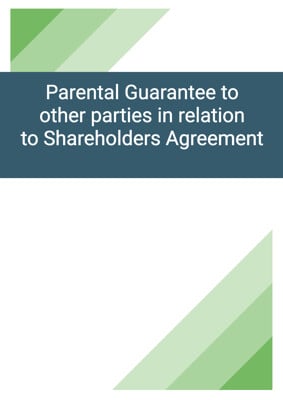How to Tailor the Document for Your Need?
01
Create Document
Fill in the details of the parties. You can click the "Fill with Member’s Information" button to complete it with information saved to your account.
02
Fill Information
Please fill in any additional information by following the step-by-step guide on the left hand side of the preview document and click the "Next" button.
03
Get Document
When you are done, click the "Get Document" button and you can download the document in Word or PDF format.
04
Review Document
Please get all parties to review the document carefully and make any final modifications to ensure that the details are correct before signing the document.
Document Preview
Document Description
This shareholders agreement is a legally binding document that governs the relations between the parties as shareholders in a jointly-owned company. The agreement highlights the importance of forming the company and establishes the terms and conditions under which the shareholders will operate. It provides a detailed interpretation of key definitions and terms used throughout the agreement.
The agreement begins with an introduction, stating the purpose of the agreement and the formation of the company. It outlines the parties' agreement to establish a new jointly-owned company in a specific country, which will acquire certain rights and assets and carry on business as outlined in the agreement.
The interpretation section defines key terms used in the agreement, such as party 1 director, party 1 shares, party 2 director, party 2 shares, and so on. These definitions ensure clarity and understanding of the roles and responsibilities of each party.
The agreement then proceeds to outline the process of establishing the company, including the incorporation of the company in the specified country. It specifies the name of the company, the authorized share capital, and the allocation of shares to each party. The completion of the establishment of the company is also defined, including the subscription and payment for shares by each party, the allotment and issuance of shares, and the execution of ancillary agreements.
The agreement further addresses capital, further finance, and dividend policy. It outlines the share capital of the company, the possibility of increasing the share capital, and the provision of further finance if required. It also sets forth the dividend policy, stating the intention to distribute a certain percentage of the consolidated profit of the company group.
The section on directors and management establishes the board of directors as the governing body of the company. It specifies the appointment and removal of directors by each party, the quorum for board meetings, voting rights, notice and agenda requirements, and decision-making processes.
Reserved shareholder matters are addressed in a separate section, which outlines specific matters that require the prior approval of the parties. These matters include the issue of shares, sale of the company, alteration to the memorandum and articles, borrowing by the company, approval of the annual budget, and more.
The agreement also includes provisions regarding the transfer of shares, confidentiality, restrictions on the parties, term and termination, supremacy of the agreement, costs, no partnership or agency, entire agreement, mutual consultation and goodwill, assignment, no rights of third parties, dispute resolution, and notices and service.
In the event of any dispute, the agreement provides for jurisdiction and specifies the method of serving notices between the parties.
This shareholders agreement is a comprehensive and detailed document that covers all aspects of the parties' relationship as shareholders in the company. It ensures clarity, transparency, and protection of the parties' rights and interests.
How to use this document?
1. Establish the company: Follow the process outlined in the agreement to incorporate the company in the specified country. Ensure that the company's name, authorized share capital, and allocation of shares to each party are in accordance with the agreement.
2. Capital, further finance, and dividend policy: Understand the provisions regarding the share capital, potential increase in share capital, and the distribution of dividends. Adhere to the agreed dividend policy and consult with the other parties on any further finance requirements.
3. Directors and management: Appoint directors in accordance with the agreement and ensure that the board of directors is constituted as specified. Follow the procedures for board meetings, voting, notice, and decision-making. Consult with the other parties on matters requiring board approval.
4. Reserved shareholder matters: Obtain prior approval from the parties for any matters listed as reserved shareholder matters. Ensure that the necessary approvals are obtained before proceeding with any actions or decisions related to these matters.
5. Transfer of shares: Adhere to the procedures outlined in the agreement for the transfer of shares. Provide transfer notices and purchase notices as required. Seek agreement on the fair price of shares or involve auditors if necessary. Complete the sale and purchase of shares within the specified timeframes.
6. Confidentiality: Maintain strict confidentiality regarding any information acquired in relation to the company, its subsidiaries, or the other party. Use such information only in the ordinary course of advancing the business and obtain consent before disclosing it to third parties.
7. Restrictions on the parties: Ensure compliance with the restriction on engaging in competing businesses during the term of the agreement. Seek legal advice if considering any activities that may be deemed competing.
8. Term and termination: Understand the minimum term of the agreement and the notice period for termination. Comply with the termination provisions in case of default, insolvency, or breach of obligations. Cooperate in the liquidation process if required.
9. Supremacy of the agreement: Recognize that this agreement prevails over the memorandum and articles of the company in case of any conflict. Use voting rights and other means to ensure compliance with the agreement.
10. Costs: Bear and pay the costs associated with the incorporation of the company. Each party is responsible for its own costs related to the preparation and execution of the agreement.
11. No partnership or agency: Understand that the agreement does not create a partnership or agency relationship between the parties. Do not commit or bind the other party without proper authorization.
12. Entire agreement: Acknowledge that this agreement, along with any other agreements entered into on completion, constitutes the entire agreement between the parties. Rely only on the representations, warranties, and undertakings expressly set out in the agreement.
13. Mutual consultation and goodwill: Act in good faith and consult fully on matters materially affecting the development of the business. Promote the best interests of the company and maintain a cooperative relationship.
14. Assignment: Do not assign this agreement or any rights or obligations without proper authorization. Any transfer of shares must comply with the provisions of the agreement.
15. No rights of third parties: Understand that third parties have no right to enforce any terms of this agreement.
16. Dispute resolution: Follow the specified jurisdiction and method of serving notices in case of any legal proceedings or disputes.
17. Notices and service: Ensure that all notices are in writing and served in accordance with the agreed methods. Keep the other party informed of any changes to contact details.
Please note that this guidance is a summary and does not cover all provisions and details of the agreement. It is important to carefully review the agreement in its entirety and seek legal advice if necessary.
Not the right document?
Don’t worry, we have thousands of documents for you to choose from:


























